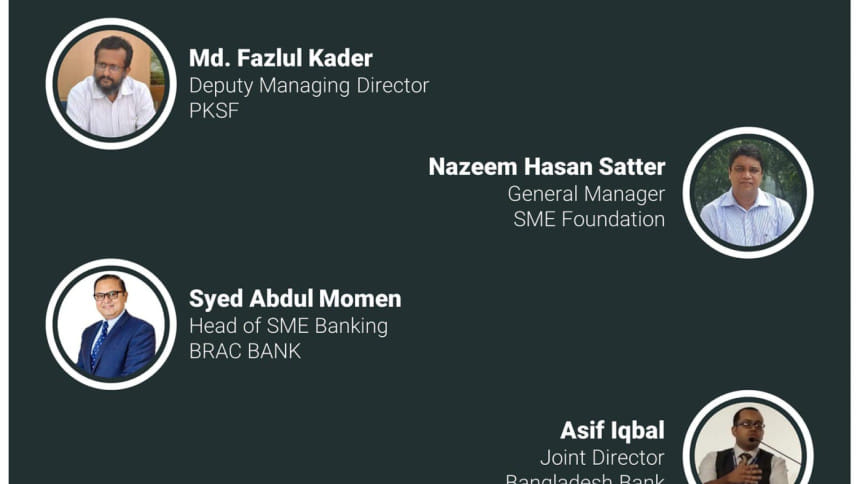YPF webinar recommends tech-oriented solutions for Small and Medium Businesses affected by Covid-19

Following webinars on Bangladesh's Healthcare and Agriculture Sectors and the Social Protection (SP) system, Youth Policy Forum (YPF) hosted one on June 4th discussing policy-driven mechanisms for increasing competitiveness of small and medium businesses in Bangladesh. The webinar titled 'Small and Medium Businesses: Way Forward Amid the Pandemic' was the sixth one in its series.
LightCastle Partners was the knowledge partner of this webinar, alongside Center for Policy Dialogue (CPD) and Bangladesh Institute of Governance and Management (BIGM). Dr. Akond Md. Rafiqul Islam, Sr. General Manager, Palli Karma-Sahayak Foundation (PKSF); Nazeem Hasan Sattar, General Manager, SME Foundation; Syed Abdul Momen, Head of SME Banking, BRAC BANK and Asif Iqbal, Joint Director, Bangladesh Bank, represented the Banking, SME, and Public sector as panelists, while Bijon Islam, CEO of LightCastle Partners, was the moderator. The virtual session also evaluated the Government's Stimulus and Refinancing Programs for COVID-affected Cottage, Micro, Small, and Medium Enterprises (CMSMEs).
The webinar was initiated with LightCastle's presentation, summarising the government's stimulus package for CMSMEs that have been affected by the pandemic and the resulting lockdown. The government has allocated a Tk 20,000 crore stimulus package, which will be available to Covid-19 affected CMSMEs in the form of subsidised working capital loans. Half of the stimulus package will be financed by banks and financial institutions, who can also avail a Bangladesh Bank-funded Tk 10,000 crore revolving refinancing scheme to fund the other half.
LightCastle's research highlighted potential challenges of implementing the stimulus package and recommendations for solving such challenges. In the discussion following the presentation, panelists also put forth their interpretations of potential challenges and critical recommendations. According to the panelists and LightCastle's own research, the exhaustive documentation required for the working capital loan applications could be an obstacle for many CMSMEs, especially in rural areas. Panelists agreed that banks and financial institutions that are funding the working capital loans would be aided significantly by a judicious credit guarantee scheme to alleviate the burden of uneven risk.
The recommendations were strengthened in a dialogue amongst the panelists regarding the following topics: collaborating with MFIs to optimise the benefits of the stimulus package, increasing CMSMEs' success at public and private procurement, increasing CMSMEs' access to formal markets, and inclusive distribution of the stimulus package to marginalised CMSMEs.
Dr. Islam of PKSF emphasised the need for collaborating with MFIs to help marginalised and rural CMSMEs: "MFIs have a well-established relationship with the micro enterprises and can ensure proper disbursement of funds from the stimulus package through credit scoring and acquiring information from SMEs with limited financial literacy." He also stated that PKSF has formulated 13 protocols to safely run operations in retail markets, wholesale markets, and online stores to help small and medium businesses thrive.
Despite contribution to 25% of Bangladesh's GDP, SMEs do not get any dedicated budget allocation from the national budget, according to Nazeem Hasan Sattar of the SME Foundation. He stressed on the importance of following India's model, which allocates significant portions of the budget to the SMEs with specific guidelines for disbursement and utilisation of the funds.
Nazeem also stressed on the need to encourage the public and private sector to procure from CMSMEs. "Government bodies along with local associations should formulate policies to encourage the public and private sectors to procure materials in larger quantities from SMEs. In addition, purchasing of local products should also be incentivised for consumers," he added.
According to Syed Abdul Momen of BRAC Bank, banks and financial institutions lending to CMSMEs will be significantly aided by a diligent credit guarantee scheme, which must be designed considering risk premiums. "Since the risk premium allocated in the stimulus package is very low, Banks will prioritise funding their existing clients because it is riskier to fund newer customers. Introduction of credit guarantee schemes with feasible participation fees can significantly reduce this stress on banks." He also emphasised on the need to digitise the manual and cash-driven supply chain of small and medium businesses. Such tech-oriented solutions, he added, would increase CMSMEs' access to different markets and shockproof CMSMEs for future crises.
Technology-oriented solutions were also recommended by Asif Iqbal of Bangladesh Bank to accelerate inclusive distribution of the stimulus package. "It is high time for us to introduce digital lending, there is no alternative for this. With proper investments, banks can easily leverage the recently approved national block-chain strategy to implement digital lending systems," he said. He also added that simplified nano-lending should be introduced to enable CMSMEs to borrow in minute amounts.
According to Bijon Islam of LightCastle Partners, CMSMEs should also actively engage to optimise the benefits of the stimulus package and increase their economic capacity. "All the responsibility should not be on banks, the onus is also on entrepreneurs to build their own capacity, be more bankable and strategise on coping up with crises of such sort," he said.
The panelists and moderator agreed that the recommendations put forth in the webinar would be critical in ensuring in success of the small and medium business sector and increasing financial inclusion. The webinar can be viewed on YPF's Facebook page and YouTube channel.
Farah Hamud Khan is a Senior Business Consultant and Ishtiak Mourshed is a Trainee Consultant at LightCastle Partners.

 For all latest news, follow The Daily Star's Google News channel.
For all latest news, follow The Daily Star's Google News channel. 



Comments